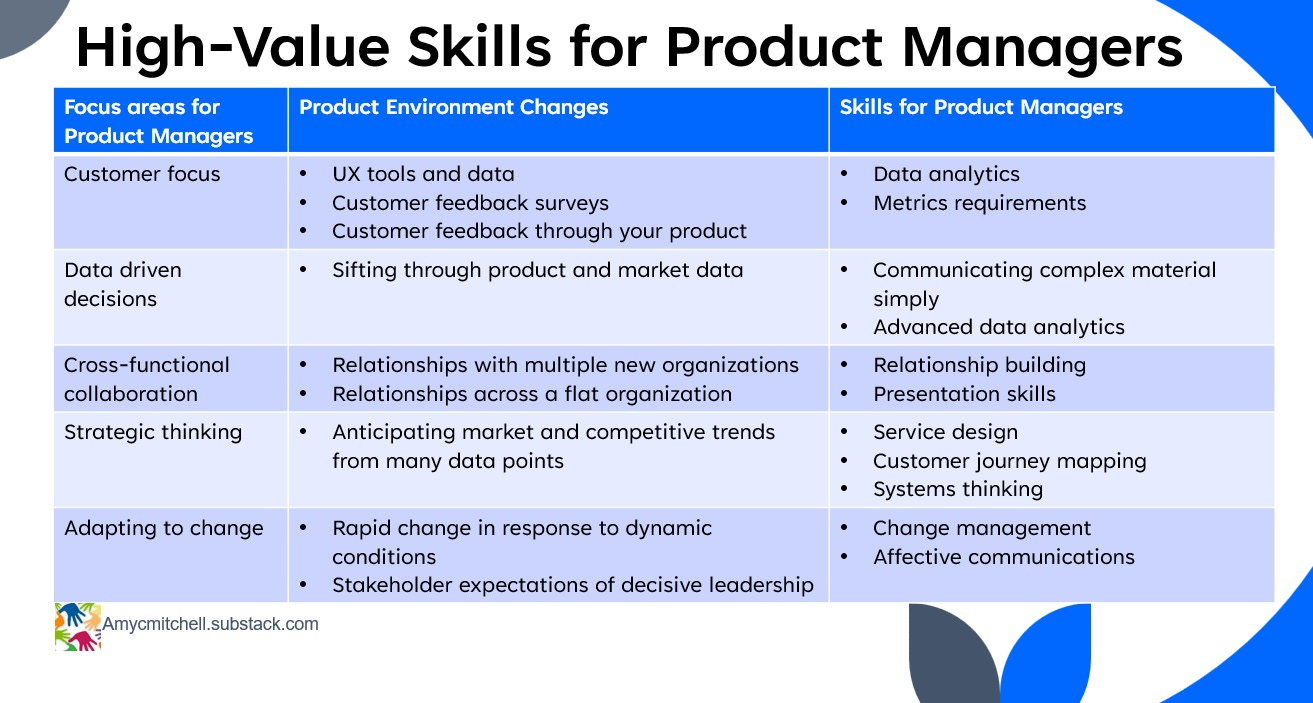The Shift in Expectations of Product Managers
How to adapt to the changing landscape in product management
Like many product managers, your calendar is usually full of product team meetings, customer conversations, and handling product issues. And you fill the open spaces with writing requirements, market research, emails, and generating marketing content. Periodically the workflow pauses a bit - usually due to the release cycle, key people taking time off, or customer slow periods.
In these times, you have some time to reflect on your next steps. Should you work on your low-priority items or consider training or surf the internet in your area? What is the best use of your time when you have some breathing room in product management?
Considering the changing landscape of product management, you can combine your low-priority tasks with learning new skills! Before discussing how to do product management work while learning new skills, let's discuss how the expectations of product managers have changed.
What Has Changed in Product Manager Expectations?
Product management skills are evolving with new technologies, new practices in product management, and customer expectations of world-class products. Some key product manager focus areas that have changed recently are:
Increased customer focus: with more tools and ways to get customer perspectives, product managers can characterize customer needs more than in the past
Data-driven decisions: product leaders are expected to make rapid decisions with relevant data points to support each product initiative
Cross-functional collaboration: use of agile methodologies puts more value on working together with many functions in each organization
Strategic thinking: product managers that can think a few steps ahead to anticipate where the product should be in the future are valuable in being prepared for market and competitive challenges
Adaptable to change: Being able to quickly adapt to changes and setbacks is a key leadership skill that you see in high-value product managers
These new areas of skill development are a bit eye-opening as you reflect on the impacts of practicing product management!
Adapting to Expectations of Product Managers
As you consider this changing landscape of product manager expectations, you notice a few skills that are in demand for product managers:
Communication skills - getting your points across effectively
Data analytics - be able to get the data you need
Collaboration - building productive relationships
Systems thinking - taking a wholistic approach to solving problems
Change management - structured process to lead people to change
The table below shows the relationship between focus areas for product managers and high-value product management skills:
With this table, product managers have a list of key skills to excel in these focus areas.
Product Management Skills Building Bit-by-Bit
When you have a slow time in your fast-paced product management role, you can take the opportunity to build on these skills with your lower-priority tasks. Here are a few ideas:
Take training on Systems Thinking and apply it to marketing material on a new feature
Read about product analytics and define metrics for feature usage
Attend a course on public speaking and present a product update to stakeholders
Collaborate with someone that knows service design to define an improvement in your customer experience
The beauty of this approach is you learn something and apply it to your product. It is a win-win!
Conclusion - Adapting to Changes in Product Management
The practice of product management continuously evolves. As you adapt to new tools and ways of being successful as a product leader, new ideas come into the product management world. The definition of success in product management changes as new technologies and market dynamics emerge.
In today's product management world, successful product managers can:
Express their customer's point of view from multiple perspectives
Make data-driven decisions
Collaborate and build relationships across flat organizations
Think strategically
Adapt to changes in and out of their product
As the role of product leadership continues to evolve, successful product managers build experience in these skills. Learning while tackling a project is a great way to adapt to changes in your product environment.






Being adaptable to change: The good thing is that this change is most often on the execution side, while the strategy remains valid. If the strategy needs to be adjusted, the mission and vision remain valid. So if you have a proper vision/mission/strategy/roadmap setup, you should always have something to guide you when you adapt to change.
Customer focus at the top. Forever and always. Love the specific examples for skill building through tasks as well.